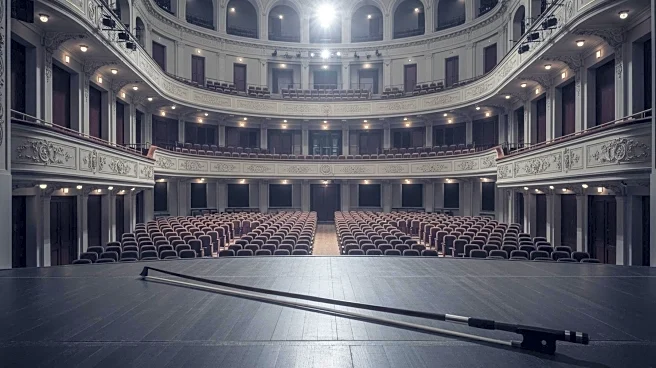What's Happening?
Four individuals were detained by French police following disruptions at a concert by the Israel Philharmonic Orchestra in Paris. The performance, led by conductor Lahav Shani and pianist Sir Andras Schiff,
was interrupted three times, including twice by protesters setting off flares. The concert, featuring works by Beethoven and Tchaikovsky, faced criticism from a French union for the performing arts and calls for a boycott by pro-Palestinian activists. Despite the disruptions, the concert resumed and concluded peacefully. French Culture Minister Rachida Dati defended the event, emphasizing the importance of freedom of creativity, while Interior Minister Laurent Nuñez condemned the disturbances and praised the police response.
Why It's Important?
The incident highlights ongoing tensions surrounding cultural events linked to Israel, reflecting broader geopolitical conflicts. The disruptions underscore the challenges faced by cultural institutions in navigating political controversies. The swift police response and government condemnation of the protests demonstrate France's commitment to maintaining public order and supporting artistic expression. The event also raises questions about the role of cultural diplomacy and the impact of political activism on artistic performances, potentially influencing future events and policies related to international cultural exchanges.
What's Next?
Legal action is being pursued by the Philharmonie de Paris against the individuals involved in the disruptions. The incident may prompt increased security measures at future cultural events, particularly those involving artists or institutions linked to politically sensitive regions. The debate over cultural boycotts and the intersection of art and politics is likely to continue, with potential implications for international cultural collaborations and the policies of venues hosting such events.
Beyond the Headlines
The protest at the concert reflects deeper ethical and cultural dimensions, including the role of art in political discourse and the responsibilities of cultural institutions in addressing global conflicts. The incident may influence public perceptions of cultural diplomacy and the effectiveness of artistic performances in fostering dialogue and understanding across political divides.










